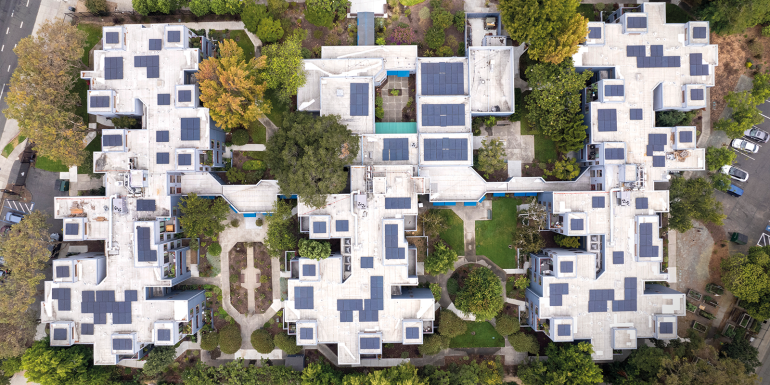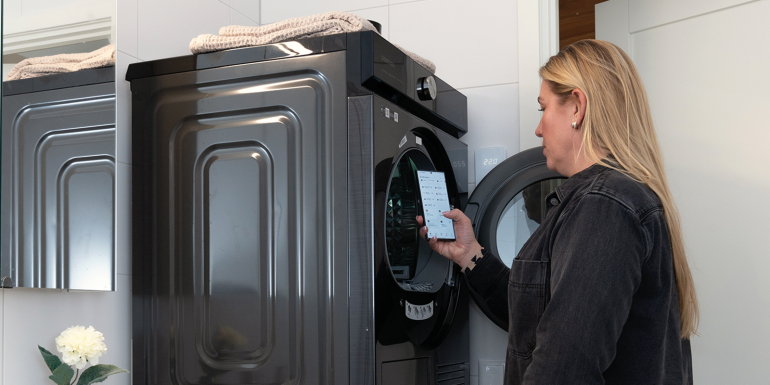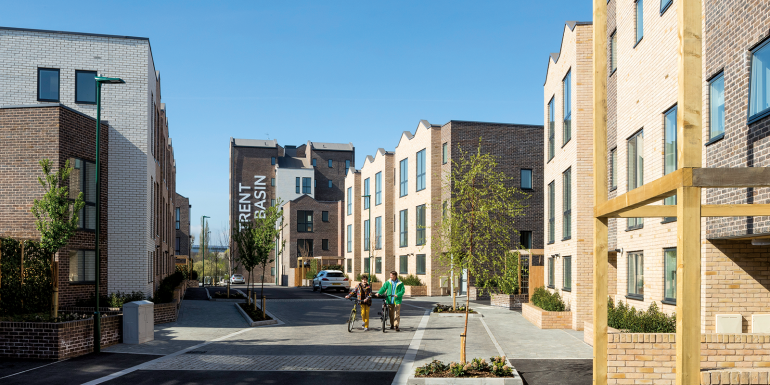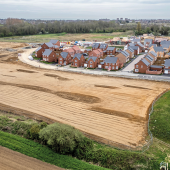Power to the people

How can the built environment work to support residents and create energy-sharing co-operatives, asks Andrew Pearson.
The climate crisis, and the response to it, presents opportunities for communities as well as threats. In the UK, there are 495 community energy organisations, which in 2021 were responsible for a total of 331MW of community-owned, renewable electricity capacity. Globally there are many more such schemes.
In addition to having a positive impact on the climate, such schemes can help reduce poverty, increase community wealth and create thriving places. Community energy schemes can take multiple forms, as these three schemes demonstrate.
St Mary’s Gardens, California, USA
In the USA, the publicly-funded installation of solar panels on St Mary’s Gardens, an affordable housing complex for low-income seniors in Oakland, California, provides clean electricity to the development.
Completed in 1980, St Mary’s Gardens consists of 101 flats set in five blocks linked by a first-floor corridor acting as the main street to provide access to a central community building. The development’s age made the flats increasingly expensive for residents to heat on northern California’s chilly winter days.
California is one of the sunniest states in the USA. Unsurprisingly, it is also the state with the highest number of roofs to benefit from solar installations. Most of these however, are on the homes of wealthier residents most able to afford the investment. To make solar energy more equitable and to reduce greenhouse gas emissions, in 2019 the state launched the $100m-a-year Solar on Multifamily Affordable Housing (SOMAH) programme.
SOMAH in action
It was financial assistance from SOMAH that funded the $345,000 community roof-top retrofit installation at St Mary’s Gardens. The solar panels that now cover the roofs of the scheme’s various blocks help reduce electrical grid carbon emissions while directly benefiting the scheme’s low-income residents, saving them about 30% – roughly $40 a month – on their electricity bills.

Although the funding programme includes education for tenants on the benefits of solar and in cutting energy use, the system itself is autonomous and requires no input from residents. SOMAH provides technical assistance to the buildings’ owners to help them deal with the construction challenges of having solar installed on their buildings. The solar installation itself is owned by the state, which has contracted with a solar power company to operate and maintain the installation for the next 20 years.
More than 100 similar low-income rental buildings have so far completed solar installations through this project. The programme’s stated goal is to generate up to 300MW through new solar projects on low-income rental buildings across the state by 2030.
Brobyholm, Sweden
In contrast to the retrofit, state-funded solar scheme in the USA, a new development of privately-owned family homes under construction in Brobyholm, Sweden, has been designed to fully integrate solar systems with the latest advances in technology and connectivity. Here, residents are responsible for the proactive operation of smart domestic appliances, heating, ventilation and electric vehicle charging to reduce energy bills and improve their sustainability credentials.
Solar panels fitted to the roofs of each house on the development are used to charge storage batteries for the whole community’s use. By sharing the generated energy and combining these with community consumption patterns and electrical grid tariffs, the scheme is intended to optimise energy consumption at the community level, resulting in lower energy costs for all dwellings.

Brobyholm, Sweden features smart appliances that can be programmed by residents to operate when electricity tariffs are most affordable
Smart systems
The ultimate goal for the development is for technology to enable all homes to be net zero through the integration of photovoltaics with energy storage, smart devices and appliances. Homes on this pioneering scheme are the first to make use of a smart home solution based on ABB-free@home and Samsung SmartThings. This enables devices and appliances to talk to each other through one interface.
Using the system, residents can programme their Samsung smart appliances, such as heat pumps, washing machines and dishwashers, to operate when electricity tariffs are most affordable and when solar energy storage levels are sufficient; when there is surplus energy generated by the solar panels, the home’s smart controls will use the surplus to top up the temperature of the hot water tank, for example. However, when solar energy is low, devices will automatically run in energy-saving mode.
In addition, the homes incorporate lighting controls that automatically adjust interior lighting levels in response to variations in outdoor light levels, while the operation of cooling and heating systems are optimised in response to external temperatures.
The homes will also feature enhanced security, including alerts for when windows and doors are open; notification of water leaks, with the ability to shut off the mains valve to prevent water damage; and the ability to remotely lock a door or window when no one is at home.
When completed, phase one of the development will create a community of around 500 dwellings, which is set to rise to 2,000 homes under phase two.
Trent Basin, England
In the UK, the Trent Basin development in Nottingham – a pilot community energy project by developer Blueprint – also uses a giant communal battery to store renewable energy generated by the scheme’s solar panels. As in Brobyholm, the 500 low-energy homes being built under this development also incorporate a suite of smart home technologies and in-home energy monitoring devices to allow residents to make informed choices about their energy use to help create a sustainable neighbourhood.
Residents on the scheme are also co-owners of Trent Basin Energy Services Company (ESCo), which was set up to run the community energy element of the project. It is the ESCo that owns the scheme’s solar panels, which are installed on roofs leased to the ESCo by the homeowners.

Trent Basin, England has its own ESCo for its residents, which owns the schemes solar panels
Scheme trials
The Trent Basin ESCo has been permitted by Ofgem to supply participants directly with locally generated energy. The University of Nottingham is currently working with the ESCo to trial different energy supply scenarios to ensure the best use of renewables and battery storage with the aim of providing residents with solar electricity directly, bypassing the grid meter. Any profits from the ESCo flow back into the community, making the scheme appealing to customers and offering the local community a stake in the energy system.
The recent study The Climate Commons, from think tank the Institute for Public Policy Research (IPPC), said that shared energy schemes, such as the one at Trent Basin, can increase “community wealth, agency and regeneration, creating thriving places while also addressing the climate crisis”. This transition to a greener economy offers the opportunity to reshape local areas in a way that improves health and wellbeing, tackles inequalities and improves quality of life. As these three energy generating and sharing schemes show, the built environment also builds communities.
Read The Climate Commons at bit.ly/IPPR_climatecommons








